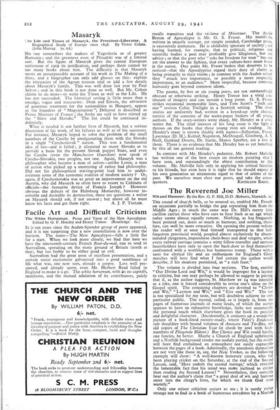Masaryk
No one remembers the makers of Yugoslavia or of greater Rumania ; and the greatness even of Pilsudski was of a limited sort. But the figure of Masaryk gives the central European settlement of 1919 its justification, and perhaps there cannot be too many books about him. The difficulty is that Masaryk wrote an unsurpassable account of his work in The Making of a Stare, and a biographer can only add glosses on this : explain the intricacies of the Agram treason trial or add a few details about Masaryk's family. This was well done last year by Paul Selver ; and in this book is not done so well. But Mr. Cohen claims to do more—to write the Times as well as the Life. He has not succeeded. The historical setting is little more than a smudge, vague and inaccurate : Deak and Eiitvos the advocates of generous treatment for the nationalities in Hungary, appear as the founders of " Magyarisation "; Delcass6 is described as Prime Minister of France ; the Serbs are said to have stirred up the " Slays and Slovaks." The list could be continued in- definitely. What is needed is not further lives of Masaryk, but a serious discussion of his work, of his failures as well as of his successes. For instance, Masaryk hoped to solve the problem of the small numbers of the Czechs by amalgamating them with the Slovaks in a single " Czechoslovak " nation. This was a fundamental idea of his—and it failed ; it alienated so many Slovaks as to provide a basis for the present Slovak puppet State, and even the Czechs (even the Manchester Guardian) now speak of Czecho-Slovakia, two peoples, not one. Again, Masaryk was a philosopher who became a man of action—unlike Lenin, a man of action who picked up a smattering of rather bad philosophy. Did not his philosophical starting-point lead him to under- estimate some of the economic realities of modern society ? Or, again, if Czechoslovakia was so great an improvement on the old Austria, why did Masaryk so often have to resort to Cabinets of officials—the favourite device of Francis Joseph ? However obvious the defects of the Habsburg Monarchy, however in- evitable and desirable its destruction, these are questions a writer on Masaryk should ask, if not answer ; but above all he must know his facts and get them right. A. J. P. TAYLOR.


































 Previous page
Previous page